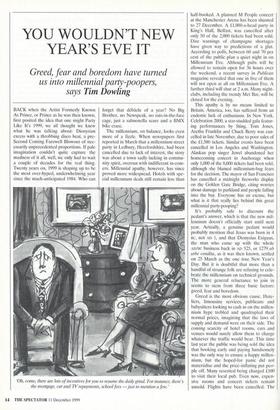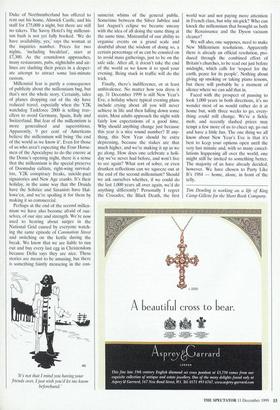YOU WOULDN'T NEW YEAR'S EVE IT
Greed, fear and boredom have turned us into millennial party-poopers, says Tim Dowling
BACK when the Artist Formerly Known As Prince, or Prince as he was then known, first posited the idea that one might Party Like It's 1999, we all thought we knew what he was talking about: Dionysian excess with a throbbing disco heat, a pre- Second Coming Farewell Blowout of nec- essarily unprecedented proportions. If pale imagination couldn't quite capture the madness of it all, well, we only had to wait a couple of decades for the real thing. Twenty years on, 1999 is shaping up to he the most over-hyped, underwhelming year since the much-anticipated 1984. Who can forget that debacle of a year? No Big Brother, no Newspeak, no rats-in-the-face cage, just a salmonella scare and a BMX bike craze.
The millennium, on balance, looks even more of a fizzle. When newspapers first reported in March that a millennium street party in Ledbury, Herefordshire, had been cancelled due to lack of interest, the story was about a town sadly lacking in commu- nity spirit, overrun with indifferent in-corn- ers. Millennial apathy, however, has since proved more widespread. Hotels with spe- cial millennium deals still remain less than
'Oh, come, there are lots of incentives for you to resume the daily grind. For instance, there's the mortgage, car and TV repayments, school fees — just to mention a few.'
half-booked. A planned M People concert at the Manchester Arena has been shunted to 27 December. A £1,000-a-head party in King's Hall, Belfast, was cancelled after only 50 of the 2,000 tickets had been sold. Dire warnings of champagne shortages have given way to predictions of a glut. According to polls, between 60 and 70 per cent of the public plan a quiet night in on Millennium Eve. Although pubs will be allowed to remain open for 36 hours over the weekend, a recent survey in Publican magazine revealed that one in five of them will not open at all on Millennium Eve. A further third will shut at 2 a.m. Many night- clubs, including the trendy Met Bar, will be closed for the evening.
This apathy is by no means limited to Britain. America, too, has suffered from an endemic lack of enthusiasm. In New York, Celebration 2000, a star-studded gala featur- ing performances by Sting, Tom Jones, Aretha Franklin and Chuck Berry was can- celled in late November, due to poor sales of the £1,500 tickets. Similar events have been cancelled in Los Angeles and Washington. Alaskan pop singer Jewel abandoned her homecoming concert in Anchorage when only 1,000 of the 8,000 tickets had been sold, although she blamed millennium-bug fears for the decision. The mayor of San Francisco has cancelled a midnight fireworks display on the Golden Gate Bridge, citing worries about damage to parkland and people falling into the bay. Everyone has an excuse, but what is it that really lies behind this great millennial party-pooping?
It's probably safe to discount the pedant's answer, which is that the new mil- lennium doesn't officially start until next year. Actually, a genuine pedant would probably mention that Jesus was born in 4 ac, not AD 1, and that Dionysius Exiguus, the man who came up with the whole AD/BC business back in AD 525, or 1279 ab urbe condita, as it was then known, settled on 25 March as the one true New Year's Day. But it is doubtful that more than a handful of strange folk are refusing to cele- brate the millennium on technical grounds. The more general reluctance to join in seems to stem from three basic factors: greed, fear and boredom.
Greed is the most obvious cause. Hote- liers, limousine services, publicans and babysitters looking to cash in on the millen- nium hype trebled and quadrupled their normal prices, imagining that the laws of supply and demand were on their side. The coming scarcity of hotel rooms, cars and venues would surely allow them to charge whatever the traffic would bear. This time last year the public was being sold the idea that booking early and paying handsomely was the only way to ensure a happy millen- nium, but the hoped-for panic did not materialise and the price-inflating put peo- ple off. Many resented being charged £100 to visit their local pub. Even now, expen- sive rooms and concert tickets remain unsold. Flights have been cancelled. The Duke of Northumberland has offered to rent out his home, Alnwick Castle, and his staff for f75,000 a night, but there are still no takers. The Savoy Hotel's big millenni- um bash is not yet fully booked. We do have availability, yes,' says the woman at the inquiries number. Prices for two nights, 'including breakfast', start at £7,300. As the countdown approaches, many restaurants, pubs, nightclubs and air- lines are slashing their prices in a desper- ate attempt to attract some last-minute custom.
Millennial fear is partly a consequence of publicity about the millennium bug, but that's not the whole story. Certainly, tales of planes dropping out of the sky have reduced travel, especially when the Y2K watchdog Taskforce 2000 is telling trav- ellers to avoid Germany, Spain, Italy and Switzerland. But fear of the millennium is more generalised and superstitious. Apparently, 9 per cent of Americans believe the millennium will bring 'the end of the world as we know it'. Even for those of us who aren't expecting the Four Horse- men of the Apocalypse to do the encore at the Dome's opening night, there is a sense that the millennium is the special preserve of Doomsday cultists, right-wing survival- ists, Y2K conspiracy freaks, suicide-pact signatories and New Age cranks. It's their holiday, in the same way that the Druids have the Solstice and Satanists have Hal- lowe'en, and we're spoiling it for them by making it so commercial.
Perhaps at the end of the second millen- nium we have also become afraid of our- selves, of our size and strength. We're now used to hearing about surges in the National Grid caused by everyone watch- ing the same episode of Coronation Street and switching on the kettle during the break. We know that we are liable to run out and buy every last egg in Christendom because Delia says they are nice. These stories are meant to be amusing, but there is something faintly menacing in the con- 'It's not that I mind you having your friends over, I just wish you'd let me know beforehand.' sumerist whims of the general public. Sometime between the Silver Jubilee and last August's eclipse we became uneasy with the idea of all doing the same thing at the same time. Mistrustful of our ability to organise events on a grand scale and doubtful about the wisdom of doing so, a certain percentage of us can be counted on to avoid mass gatherings, just to be on the safe side. After all, it doesn't take the end of the world as we know it to spoil your evening. Being stuck in traffic will do the trick.
Finally, there's indifference, or at least ambivalence. No matter how you dress it up, 31 December 1999 is still New Year's Eve, a holiday where typical evening plans include crying about all you will never achieve in life and then falling down some stairs. Most adults approach the night with fairly low expectations of a good time. Why should anything change just because this year is a nice round number? If any- thing, this New Year should be extra depressing, because the stakes are that much higher, and we're making it up as we go along. How does one celebrate a holi- day we've never had before, and won't live to see again? What sort of sober, or even drunken reflections can we squeeze out at the end of the second millennium? Should we ask ourselves whether, if we could do the last 1,000 years all over again, we'd do anything differently? Personally I regret the Crusades, the Black Death, the first
world war and not paying more attention in French class, but why nit-pick? Who can knock the millennium that brought us both the Renaissance and the Dyson vacuum cleaner?
We will also, one supposes, need to make New Millennium resolutions. Apparently there is already an official resolution, pro- duced through the combined effort of Britain's churches, to be read out just before midnight, which calls for 'respect for the earth, peace for its people'. Nothing about giving up smoking or taking piano lessons, but there will probably be a moment of silence where we can add that in.
Faced with the prospect of pausing to look 1,000 years in both directions, it's no wonder most of us would rather do it at home but, with three weeks to go, every- thing could still change. We're a fickle mob, and recently slashed prices may tempt a few more of us to cheer up, go out and have a little fun. The one thing we all know about New Year's Eve is that it's best to keep your options open until the very last minute and, with so many cancel- lations happening all over the world, one might still be invited to something better. The majority of us have already decided, however. We have chosen to Party Like It's 1984 — home, alone, in front of the telly.
Tim Dowling is working on a life of King Camp Gillette for the Short Book Company.



























































































 Previous page
Previous page